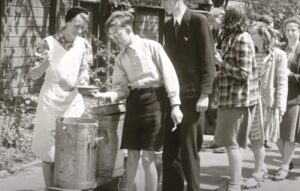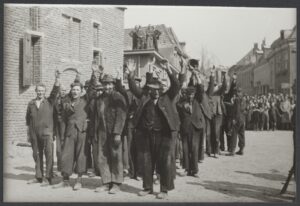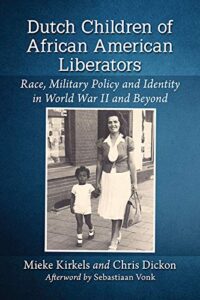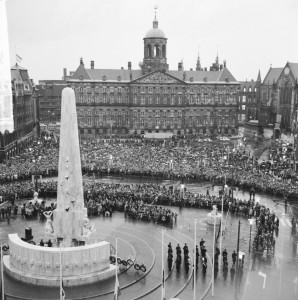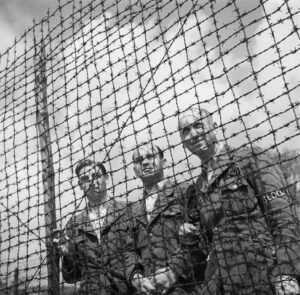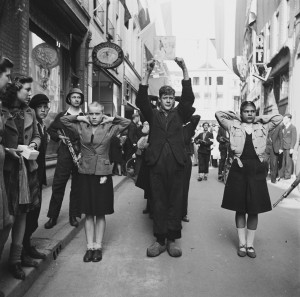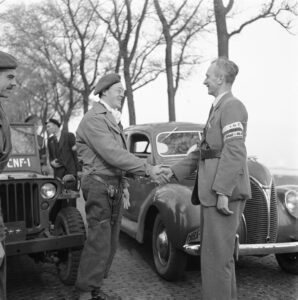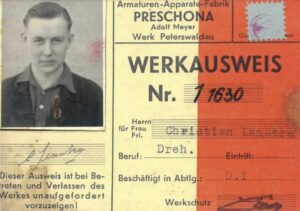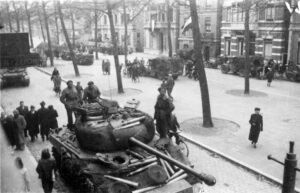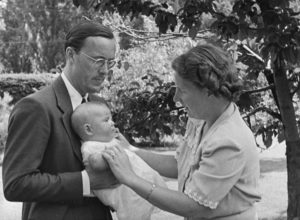A gaarkeuken is a soup kitchen, a place where poor people could go to be fed. Gaarkeukens are best known from World War II, when the watery soup they supplied was the only food for many people in the west of the country. The Hunger Winter of 1944/1945 had left people desparately hungry. Soup kitchens remained in use for a while after the liberation, until people were able to take care of themselves again. Nowadays, the word gaarkeuken is no longer in use, but there are voedelbanken (food … [Read more...]
Dutch term – NSB-er
An NSB-er was a member of the Nationaal Socialistische Beweging [Nationalist Socialist Movement] in the Netherlands before and during World War II. The NSB was the party that welcomed the German occupation and collaborated with the nazis. During World War II, NSB membership was a requirement for many public offices, including being appointed as mayor. After the war, NSB members were arrested and investigated for collaboration. See the article Finding Collaborators in World War II for more … [Read more...]
New book: Dutch Children of African American Liberators
A new book was just announced, written by Mieke Kirkels and Chris Dickon: Dutch Children of African American Liberators: Race, Military Policy and Identity in World War II and Beyond. … [Read more...]
Dutch term – Slachtoffer
The word slachtoffer means "victim" or "casualty." On 4 May, the Dutch commemorate the casualties since World War II. The 4 May date was chosen because 5 May is Liberation Day, the anniversary of the liberation of the Netherlands on 5 May 1945. We commemorate before we celebrate. Two years ago, I was at the National Genealogical Society conference in Grand Rapids on 4 May. You can read the speech I gave at the banquet to jointly commemorate the victims. … [Read more...]
Quick tip – Website War Lives
The website War Lives documents the lives of people during World War II using original records from the period. The website shows a time line for each person, and links to the sources that were used to compile the information. Sources include war graves, databases of prisoners in camps in the Netherlands and the East Indies, documentation about resistance groups, cards of people in Japanese internment camps in the Dutch East Indies, and lists of victims killed in concentration camps in … [Read more...]
Dutch term – Fout
Fout means "wrong" or "error." Dutch records are pretty reliable in general but we should always look for multiple independently created original records to prevent one error from leading us astray. In World War II, the word fout got a special meaning. It was used to indicate people who collaborated with the Germans. Many of them were prosecuted for collaboration after World War II. Their court records can be found in the Central Archives for Special Jurisdiction at the National Archives in … [Read more...]
Dutch term – Binnenlandse Strijdkrachten
Binnenlandse Strijdkrachten or Domestic Armed Forces was a resistance organization in World War II. During World War II, there were many resistance local organizations working all over the country. When the liberation of the Netherlands started in September 1944, these organizations merged to form the Binnenlandse Strijdkrachten. Head of the organization was Prince Bernhard, the husband of crown princess Juliana. My grandfather Jan Marijnissen joined the Binnenlandse Strijdkrachten in … [Read more...]
Dutch term – Dwangarbeider
A dwangarbeider is a forced laborer. During World War II, many able men from the Netherlands were forced to work in Germany. The German factories and other places of employment needed laborers since so many of their own men were fighting in the army. Local labor offices in the Netherlands coordinated the placement. Both my grandfathers were required to go to Germany as forced laborers. My paternal grandfather Henk Hoitink went into hiding on my grandmother's farm (his fiancée at the time) … [Read more...]
Dutch Records that became Public on 1 January 2020
Happy New Year everybody! Many records become public after 25, 50, 75, or 100 years. Here is an overview of some of the records that became public as of 1 January 2020. Exceptions may exist for records that involve people that could still be alive. Civil registration records: Birth records from 1919 Marriage records from 1944 Death records from 1969 Legal records: Court records from 1944 Police records from 1944 National government records: Minutes of the … [Read more...]
Dutch records that are public as of 1 January 2019
Happy New Year everybody! Many record series have schedules that determine when they become public. Here are some of the civil registration records that have become public today: Birth records from 1918, which includes my maternal grandfather Johannes Marijnissen. Marriage records from 1943, which includes my maternal grandparents Johannes Marijnissen and Catharina Flooren. Death records from 1968. Not all archives immediately scan and index those records, so they may not be … [Read more...]
